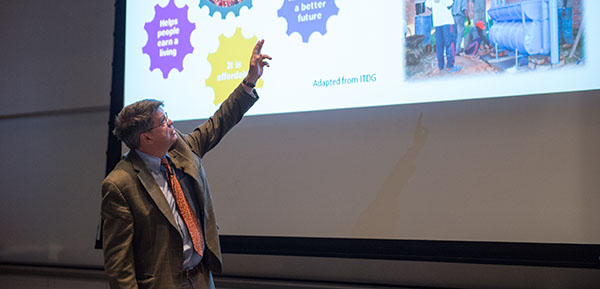
Dr. Bernard Amadei, Professor of Civil Engineering at the University of Colorado at Boulder and former Faculty Director of the Mortenson Center in Engineering for Developing Communities, delivered the eighth annual Korybalski Lecture on May 15, 2015. Amadei’s talk, which was titled “Global Engineering for a Small Planet; A Vision of Success,” focused on how a surge in global population, 95 percent of it being in developing or underdeveloped countries, will create unprecedented demands for energy, food, land, water, transportation, materials, waste disposal, earth moving, health care, environmental cleanup, telecommunication, and infrastructure.
Because of Amadei’s background as the Founding President of Engineers Without Borders – USA and the co-founder of the Engineers Without Borders – International Network, he was able to offer a great deal of insight on the role engineers will need to play in the next 20 years to fulfill the demands of those growing populations in developing and underdeveloped countries. He posed the question of whether or not today’s engineering graduates and engineers will possess the skills needed to address the global problems that our planet and humans are facing in the future and touched on the point that a new epistemology of engineering practice and education is needed, one that is based on the idea of reflective and adaptive practice, system thinking, engagement, and a holistic approach to global problems.
Amadei earned his PhD in 1982 from the University of California Berkley and among various other distinctions he was the 2007 co-recipient of the Heinz Award for the Environment, the recipient of the 2008 ENR Award of Excellence, an elected member of the U.S. National Academy of Engineering, served as a Science Envoy to Pakistan and Nepal for the U.S. Department of State in 2013 and 2014 and is the recipient of five honorary doctoral degrees.
Amadei’s lecture was a part of the annual lectureship endowed by Michael Korybalski, chair of the ME External Advisory Board and former chief executive officer of Mechanical Dynamics. The lectureship was created as a means to bring high-profile, inspiring speakers to the U-M community to help promote the impact of engineers on large societal problems, including energy and environment, health and quality of life, national security and disaster prevention.